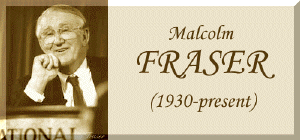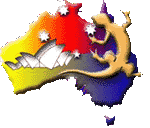|
       |
John Malcolm Fraser was born in Toorak, Melbourne on 21 May 1930, son of a wealthy landowner. His grandfather had been a senator in the first Federal Parliament. After graduating from Oxford he returned to Australia in 1952 to manage the family property "Nareen", situated in the Western District of Victoria. At age 25 with help from Gorton and Fadden he won the previously safe Labor seat of Wannan. The following year he married Tamie Beggs and together they had four children. Harold Holt appointed him Minister for the Army in 1966. Under McMahon he held the position of Minister for Education and Science, where he enthusiastically supported private schooling. In the leadership contest following McMahon's defeat by Whitlam, Snedden beat Fraser to become leader of the Liberal Party. After the 1974 election loss Snedden was seen as the wrong candidate to take on the powerful Gough Whitlam. Fraser's supporters believed that he would make an effective opposition leader and engineered two leadership challenges. On the second challenge in March 1975 Fraser was elected Party leader. Fraser attacked the Government on its mismanagement, shady dealings and political naivete. The Liberal/Country Party Coalition's refusal to pass the supply bills resulted in the constitutional crisis of November 11 when the Governor-General sacked Whitlam. Fraser was appointed caretaker prime minister until the general elections of December 1975. Fraser won a resounding victory with a big enough majority to govern without the Country party. He chose to retain the coalition and appointed Doug Anthony as his deputy. The task of the new government was to bring down inflation, now running at 20%, to reduce unemployment and the high interest rates. To achieve these goals Fraser believed that Australian industry should be boosted by added protection (Whitlam had reduced tariffs), by maintaining monopolies (e.g. the two airline policy), by standing up to union claims for higher wages and by persuading overseas buyers and investors that they could have confidence in Australia's economy. Public expenditure was drastically cut and many of Labor's reforms were abandoned or modified. Medibank was no longer compulsory, Fraser abandoned regional development as too costly and funding for the National Sewerage Program was withdrawn. There was a crack-down on 'dole bludgers', and a 12 month wage freeze in 1982. Like Whitlam, the Fraser Government was dogged by sackings, resignations and scandals. Treasurer Lynch was forced to resign accused of using insider financial information to improperly profit from land transactions; Sheil was sacked for defending Apartheid; Withers was sacked for misleading Parliament about proposed changes to electoral boundaries in Queensland; MacKellar was forced to resign for failing to declare a colour television set. Peacock resigned accusing Fraser of disloyalty, and McMahon retired, complaining that Fraser never listened to him on economic matters. On foreign affairs Fraser took a pro British and American stance, supporting ANZUS and the presence of American communications bases in Australia. He strongly protested the Soviet invasion of Afghanistan and wanted Australia to boycott the 1980 Olympic Games being held in Moscow. He continued to support China as an enemy of the Soviets, which meant accepting China's ally Kampuchea, then under the Pol Pot regime. Fraser is held in great respect in black Africa for his participation in framing the agreement to end the civil war in Rhodesia, paving the way for the new state of Zimbabwe. He never lost an opportunity to speak on the evils of Apartheid, refusing visits to Australia by sporting teams chosen on racial grounds.Fraser faced three elections after 1975. He promised tax cuts prior to the 1977 election, which had been called a year early fearing the economic situation would deteriorate. Fraser won the 1980 election by raising fears of a Labor capital gains tax which would extend to profit from the sale of a family residence, but his majority was halved. Fraser decided to call an election in March 1983, anticipating a change of Labor Party leadership later in the year. At the very same time he was asking the Governor-General for a double dissolution, Bob Hawke replaced Bill Hayden as leader. The election was very much a contest between the two leaders. Hawke was confident, had a good record as ACTU leader of handling industrial disputes and his promises, like stopping the damming of the Franklin River, appealed to conservationists and some undecided voters. With the defeat of the Liberal Party Fraser resigned from Parliament and retired to run his property. He has since won world respect and admiration for his role as joint-head of the Eminent Persons Group, committed to ending Apartheid. Copyright unknown
|
|
|
|
[ Virtual
Australia | The
World We Live In | The
Things We Do ]
Problems/Broken Links can be reported
to
All text and
graphics unless otherwise stated are ©1998-2000 Kim Holden, Virtual Australia.
|

![[Visit Oska]](../../images/oska003.gif)
